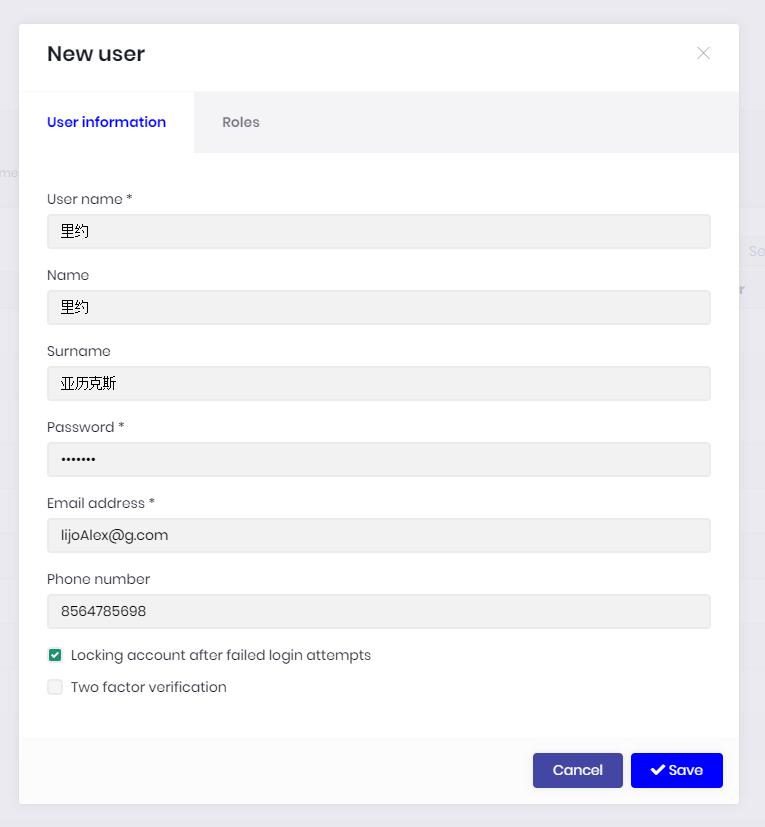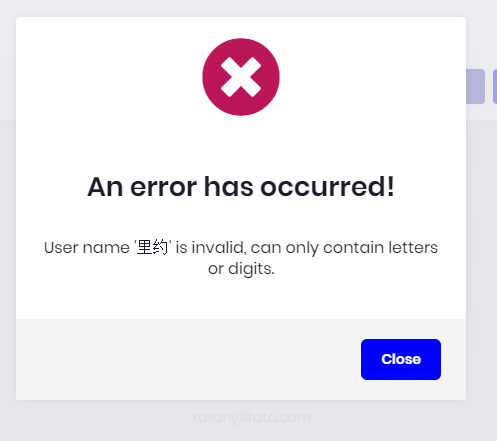Activities of "lalitChougule"
Hi @alper,
I tried to implement "Multi Lingual Entity" I created the Entity using IMultiLingualEntity & IEntityTranslation as per the document
But I got stuck in this part CreateMultiLingualMap https://aspnetboilerplate.com/Pages/Documents/Multi-Lingual-Entities#createmultilingualmap
If you can guide me how to map the entities , It will be helpful
Thanks
- ABP Framework version: v2.7.0
- UI type: Angular
- Tiered (MVC) or Identity Server Seperated (Angular): yes
- Exception message and stack trace:N.A
- Steps to reproduce the issue:N.A
What I have now : I have a table which contains name of the countries e.g.
1. India
2. China
3. Russia
4. ...
This data comes from the database which is stored in english and is displayed in one of my form through dropdown
What I want to achieve : If my user changes the language to chinese from the language dropdown I want to show him the converted text i.e.
1. 印度
2. 中国
3. 俄国
4. ...
All my data in database is stored in English I want to display that data as per the language selected by the user Is there a way to achieve this ?
Thanks alot @liangshiwei It worked
Hi,
As you said I tried implementing AudtingStore.
But I was not able to log the data like AbpAuditLog.I think I missed out something
I got reference from the source code
Below is my code , Please help if something is wrong in the implementation
[Dependency(TryRegister = true)]
public class AWSAuditingStore: IAuditingStore, ISingletonDependency
{
public ILogger<AWSAuditingStore> Logger { get; set; }
public AWSAuditingStore()
{
Logger = NullLogger<AWSAuditingStore>.Instance;
}
public Task SaveAsync(AuditLogInfo auditInfo)
{
Logger.LogInformation("AWSAuditingStore : {0}", auditInfo.ToString());
return Task.FromResult(0);
}
}
Thanks @liangshiwei
It will be very helpfull if u can provide some sample code to demonstrate implementation of custom AudtingStore
Hi,
I have implemented Serilog.Sinks.AwsCloudWatch to log my data to AWS-CloudWatch
But the problem is according to the documentations of SeriLog I can log data as per LogEventLevel to the CloudWatch which creates huge amout of unnecessary data
What if I want to log only the data which get logged into AuditLog and AuditLogAction table from database to AWS-CloudWatch.
Is this possible and how to implement it ?
- ABP Framework version: v2.7.0
- UI type: Angular
- Tiered (MVC) or Identity Server Seperated (Angular): no / Yes
- Exception message and stack trace: User name '里约' is invalid, can only contain letters or digits.
- Steps to reproduce the issue: Create User as per screenshot attached
I want to create user by providing chinese character as input but came accross this error
How do I set rule to allow chinese letters ?
Check the docs before asking a question: https://docs.abp.io/en/commercial/latest/ Check the samples, to see the basic tasks: https://docs.abp.io/en/commercial/latest/samples/index The exact solution to your question may have been answered before, please use the search on the homepage.
- ABP Framework version: v2.7.0
- UI type: Angular
- Tiered (MVC) or Identity Server Seperated (Angular): no / Yes
- Exception message and stack trace: N.A
- Steps to reproduce the issue: N.A
Hi,
I need to know how the record get inserted into AbpAuditLogs and AbpAuditLogActions as I want to implement a bit customized logging of my own.
How can I implement the same for my own tables or you can say I just want to insert only few Http Status code related data to my own custom table.
How can I do it ?
Thanks @liangshiwei
It worked, Just last question which remained unanswered before
How do we Check Duplicate Entities in Fluent Validators ?
I want to cross check from my Address table whether this record is already present in my table ( i.e duplicate address )
Is it possible in Fluent Validator ?
And how do I do it ?
Thanks @liangshiwei
My DTO's are as below :
CustomerDto
public class CustomerDto : AuditedEntityDto<Guid>
{
....
}
AddressDto
public class AddressDto : AuditedEntityDto<Guid>
{
....
}
OrderDto
public class OrderDto : AuditedEntityDto<Guid>
{
public CustomerDto Customer { get; set; }
public AddressDto Address { get; set; }
}
As per your above solution I tried injecting IStringLocalizer<MyProjectResource> localizer as below
CustomerDtoValidator
public class CustomerDtoValidator : AbstractValidator<CustomerDto>
{
public CustomerDtoValidator(IStringLocalizer<MyProjectResource> _localizer)
{
....
}
}
AddressDtoValidator
public class AddressDtoValidator : AbstractValidator<AddressDto>
{
public AddressDtoValidator(IStringLocalizer<MyProjectResource> _localizer)
{
....
}
}
But I am not able to Implement below code for OrderDto :
public class OrderDtoValidator:AbstractValidator<SupplierCombinedDto>
{
public OrderDtoValidator()
{
RuleFor(x => x.Customer).SetValidator(new CustomerDtoValidator()); <-- ERROR
RuleFor(x => x.Address).SetValidator(new AddressDtoValidator()); <-- ERROR
}
}
ERROR: There is no argument given that corresponds to the required formal parameter '_localizer' of CustomerDtoValidator(IStringLocalizer
What should I pass as argument ?

